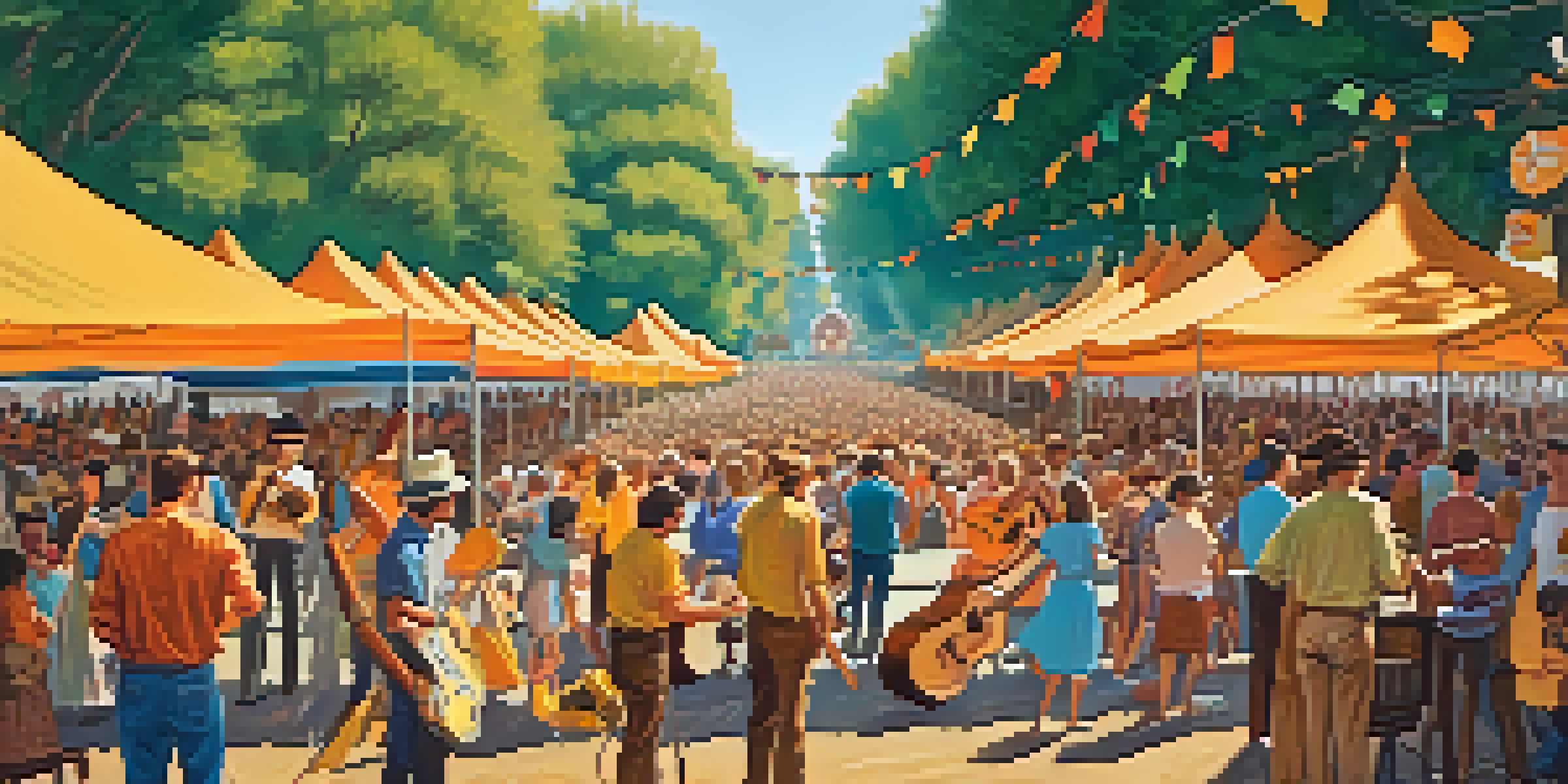Folk Guitar and Social Change: The 1960s Impact

The Rise of Folk Music in the 1960s
The 1960s marked a significant revival of folk music, with artists like Bob Dylan and Joan Baez leading the charge. This genre resonated deeply with the youth, who were searching for a voice during a tumultuous period in American history. Folk music's acoustic simplicity allowed it to be both accessible and powerful, making it the perfect soundtrack for a generation seeking change.
The purpose of music is not a rarified, intellectual distillate—it is a very human one: that is, it is a way of maintaining our sanity.
As the decade unfolded, folk music became synonymous with the counterculture movement. It served as a platform for expressing discontent with political and social issues. The melodies were often simple, but the lyrics were profound, addressing everything from civil rights to the anti-war sentiment.
By the end of the 1960s, folk music wasn't just a style; it had evolved into a movement that united people in their quest for justice and equality. The sound of the guitar became a rallying cry, connecting communities and amplifying their messages of hope and change.
Folk Guitarists as Activists
Many folk guitarists of the 1960s were not just musicians; they were passionate activists. Artists like Pete Seeger and Woody Guthrie used their music to promote social causes and bring awareness to injustices. Their songs often told stories of struggle, inspiring listeners to take action in their own communities.

The power of a simple melody combined with poignant lyrics was undeniable. For instance, Seeger's rendition of 'We Shall Overcome' became an anthem for the civil rights movement, embodying the spirit of determination and resilience. These artists encouraged audiences to envision a better world, pushing for legislative and social changes.
Folk Music as a Voice for Change
In the 1960s, folk music became a powerful medium for expressing political and social discontent, resonating with a generation seeking justice and equality.
Through concerts and gatherings, folk musicians galvanized people to stand up for what they believed in. The guitar became more than an instrument; it was a tool for advocacy, fostering a sense of solidarity among those striving for social progress.
The Influence of Civil Rights Movements
The civil rights movement of the 1960s had a profound impact on folk music, shaping its themes and narratives. Artists wrote songs that highlighted the struggles faced by African Americans, bringing attention to issues like segregation and inequality. This music played a vital role in mobilizing support and encouraging activism across diverse demographics.
Music can change the world because it can change people.
Songs like 'A Change is Gonna Come' by Sam Cooke and 'Strange Fruit' by Billie Holiday resonated with the movement's call for justice. These pieces not only captured the pain of oppression but also instilled hope for a brighter future. Folk guitarists often covered these songs, amplifying their messages and reaching wider audiences.
The intersection of music and social justice created a unique cultural phenomenon. Folk concerts became spaces for dialogue and solidarity, where individuals from various backgrounds came together to advocate for civil rights and equality through the power of song.
The Anti-War Movement and Folk Music
As the Vietnam War escalated, folk music became an essential tool for the anti-war movement. Artists used their platforms to voice opposition to the war, galvanizing public sentiment against military involvement. Songs like 'Where Have All the Flowers Gone' by Pete Seeger highlighted the futility of war and the loss of life, resonating deeply with a disillusioned generation.
Folk concerts often turned into rallies, where musicians and attendees alike expressed their frustrations and hopes for peace. The acoustic sounds of the guitar provided a soothing yet powerful backdrop to passionate speeches and protests. This blend of music and activism created a sense of community among those who sought to challenge the status quo.
Artists as Activists
Folk musicians like Pete Seeger and Bob Dylan used their songs to advocate for civil rights and anti-war sentiments, inspiring audiences to take action.
Through their lyrics and performances, these artists not only protested the war but also inspired a cultural shift towards peace and understanding. The folk guitar became a symbol of resistance, uniting people in their fight against violence and advocating for a more harmonious world.
Folk Music Festivals as Platforms for Change
Folk music festivals in the 1960s, such as the Newport Folk Festival, became vital spaces for spreading social messages. These gatherings brought together diverse artists and audiences, fostering a sense of unity and purpose. Festivals showcased not just music but also discussions on pressing social issues, making them hubs for activism.
Performers used their time on stage to advocate for various causes, from civil rights to environmental awareness. The energy of the crowd amplified these messages, creating a collective consciousness focused on change. It was a unique blend of art and activism, where every note played was a step toward progress.
These festivals set the stage for future generations of musicians to continue the legacy of using art as a means of social change. The folk guitar, strummed in unison, echoed the hopes and dreams of a society yearning for justice and equality.
Legacy of 1960s Folk Music
The influence of 1960s folk music continues to resonate today, inspiring contemporary artists and movements. Many modern musicians draw on the themes of social justice and activism established by their predecessors. The folk guitar remains a symbol of change, reminding us of the power of music to foster awareness and inspire action.
Songs from the 1960s are often revisited and reinterpreted, demonstrating their timeless relevance. For example, contemporary artists like Hozier and Mumford & Sons incorporate folk elements into their music, addressing today’s social issues through a familiar lens. This connection to the past underscores the enduring impact of the folk genre.
Legacy of Folk Music Today
The themes of social justice established in the 1960s continue to influence modern artists, highlighting the enduring power of folk music in advocating for change.
As we reflect on the legacy of folk music in the 1960s, it becomes clear that its power lies in its ability to unite and inspire. The strumming of a guitar can spark conversations and movements, proving that music is not just entertainment but a catalyst for social change.
Conclusion: The Enduring Power of Folk Guitar
In conclusion, the folk guitar of the 1960s played a pivotal role in shaping social change through music. Its ability to convey powerful messages and connect people from different backgrounds was instrumental in various movements. This era taught us that music can be a formidable force for good, bridging gaps and fostering understanding.
As we look back, it's essential to recognize the artists who used their talents to challenge injustices and inspire action. Their commitment to social causes through folk music has left a lasting impact that continues to inspire future generations. The stories told through their songs remind us of the power we hold to effect change.

Ultimately, the legacy of folk guitar serves as a reminder of the importance of using our voices—whether through music or other means—to advocate for a better world. The echoes of the 1960s still resonate today, urging us to continue the fight for justice and equality.